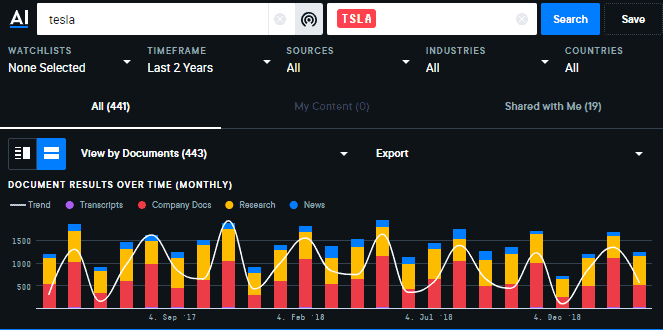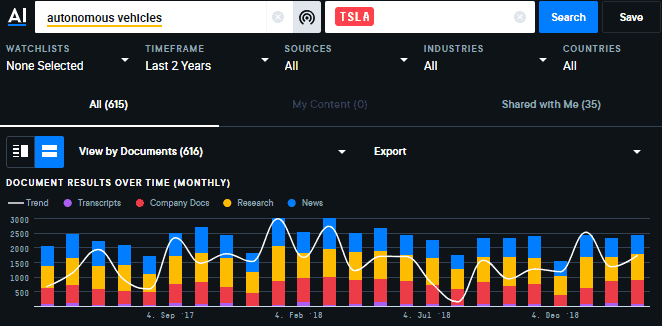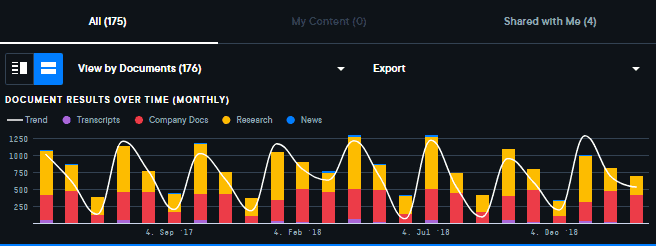When it comes to fundamental investment research, the 80/20 rule, or Pareto principle, regarding cause and effect might not be as applicable as in other industries.
The notion that, “80 percent of an investment thesis comes from 20 percent of the research” is invalidated by many instances when a single piece of information can completely change investors’ perception of the stock. It’s vital to have all of the publicly available information on a company in order to prevent a costly mistake.
To do this, investors gather valuable intel about competitors and gauge the perception the business world has of the company. While other search alternatives might be able to help out with some aspects of this, they can’t find all the information that an intelligent research engine can provide. AlphaSense enables investors to efficiently sift through thousands of companies’ filings, presentations and transcripts in a matter of seconds.
AlphaSense allows users to easily search beyond their investment universe. Using the reverse search technique to look at what others are saying about a company, the relevant macro trends, and how other companies use similar methods can lead to new opportunities and efficient comparative analysis. But most importantly, it eliminates uncertainty from the research process.
How To Use Reverse Search For Investment Research
The following searches have become permanent steps in my research process:
The Company and Directors search
The most straightforward way to fully understand the competitive landscape and the perception of the researched company by the wider public is to simply see where and how the company is being mentioned. In order to do so, enter the company name into the AlphaSense keyword search box, and enter a minus (-) sign before typing the company ticker into the ticker search box.
This will show us all company mentions in other companies’ filings, press releases, transcripts, news articles and industry journals.
Let’s look at Tesla (TSLA) for example. Above shows a view of all mentions of Tesla from other companies over time. This allows you to see when companies were talking about Tesla the most, giving you insight on how the company has trended.
To refine further, sort by Industry, or Company. Sorting by company will provide a list of companies that have discussed Tesla, and how often. For market intelligence teams, this list can be flagged, stored, or put on a watchlist for continuous real-time tracking of ongoing conversations.
Sorting by industry will help you compare how different industries are discussing Tesla in different contexts. The Automotive industry, for example, may have more mentions of auto sales, while the Energy sector may be more focused on innovations in electric vehicles. The tech sector (as well as the auto sector), may want to know more about autonomous vehicle technology.
These findings through AlphaSense help generate new ideas for teams to consider when performing comparative research.
Apart from searching for company name, you can also search for the names of the board directors and their top management, which can sometimes lead to revealing their past performance or experience that would be otherwise buried.
Business keyword search
Another way to learn about a company’s competitive landscape is by searching relevant industry keywords. Many times industries and individual firms use words that are relevant only for them and searching for these specific keywords can show what the investment universe and other companies are saying about it.
But, what happens when you run a keyword search on a larger industry with many key terms used in disparate ways? AlphaSense can aid those searches, too, by using a proprietary feature called Smart Synonyms. Smart Synonyms automatically expands user’s keyword searches to include related industry terms. This allows users to search on a basic term and receive results with related synonyms.
Let’s go back to our Tesla example. For this search, we decided to focus on other company mentions of autonomous vehicles. The language variability for a term like that can be staggering. Some companies may opt to use the term self-driving car, driverless vehicle, or autonomous cars, just to name a few.
With legacy search tools, it can be difficult to ensure you’re catching all relevant mentions (given the scope of terminology used) without performing multiple complex searches. Smart Synonym technology can aggregate these results within one search, delivering a broader scope of results in a fraction of the time.
Accounting method search
Whether companies follow U.S. Generally Accepted Accounting Principles (GAAP), or International Financial Reporting Standards (IFRS), accounting standards are complex and sometimes arcane. This makes it time-consuming for investors to understand the way companies are presenting its numbers.
Using the reverse search method in AlphaSense, you can gain a clearer understanding of these accounting principles. Just look at how other companies utilize the same method through a reverse search.
For example, let’s look at the term accretable yield. This is a way to account for loans with deteriorated credit quality and has been utilized for many subprime loans after the financial crisis.
In essence, this accounting method allows the management to forecast the payments of interest and principle. It also helps recognize income on the basis of this forecast, not on the actual real payments of interest and principal. Given the obvious risk involved (it leaves the management with a significant amount of discretion), researchers may want to obtain as much relevant insight as possible.
A Google search returns roughly 19,500 results for the term accretable yield. While there are plenty of resources available, you would need to refine further to pinpoint the most relevant and helpful pieces of information, and put it into context — taking time away from focusing on distilling those insights into actionable decisions.
With AlphaSense, and found that despite its relative obscurity, accretable yield is used and mentioned by many financial service companies (see below).
By focusing in on financial companies, you can compare disclosure and description of the accounting method. This allows teams to grasp the concept within a few hours – instead of days.
Using reverse search with AlphaSense
By utilizing reverse search in AlphaSense, you can find new relevant information that would be otherwise hidden in the haystack. AlphaSense helps find information that would otherwise be laborsome or impossible to find anywhere else. Using AlphaSense takes away uncertainty from the research process and investment thesis, which is what matters the most.
Jan Svenda is an independent equity analyst focused on the U.S. Small/Micro-cap space. He searches for long ideas trading around Net Current Assets Value (NCAV) and for short ideas which showcase a significant potential for aggressive or manipulative accounting.
.png)











